
O F
T H E
V O Y A G E
O F
T H E
A R G O :
Q U E S T
O F
T H E
G O L D E N
F L E E C E
V I I
A N N O
S T E L L A E

Struggling along, they hardly noticed the small boy who peered at them from the top of the grassy riverbank. He vanished when an Argonaut called to him, just as a wild animal would leap away into cover. They thought nothing of it as they kept working to free the Argo.
It was such a strange sound they had to look and see--and then they
realized it was not war but a welcoming party of native people gathered on the bank. The arrows had merely been to get their attention--at least they hoped
it was.
Warily, Jason and his crew, with weapons in hand, went to meet
the people, whom they judged were the Colchians.
The people, seeing them come armed, drew back alarmed, but Jason decided
these country people were not hostile, and told his men to lay their swords
down. When they did this, the people ran forward, encircling the crew and captain, putting garlands on them, and singing and playing their strange-crafted
harps and wailing flutes.
The people had wine for the Argonauts, but they beckoned for Jason to follow with his men, and they were led to a nearby village, set up on higher ground where fruit trees and vineyards were growing abundantly. It seemed a propsperous place, with plenty livestock too. The village had evidently stopped everything to greet the strange ship and its crew, and Jason
was pleased that his men had such a warm welcome instead of a fight on their hands.
Three days later, after much feasting, dancing, and singing (but not much resting and sleeping), the Argonauts made it known they must be going--they had important business with the king. This was done in trader language, an argot of Akkadian, Tyrian, and Ilian, which was widespread enough in the world enough to reach even this out of the way corner.
The villagers were a bit sobered by the news. Jason asked about the king, seeing the look on their faces. Was he a good king or was he evil?
This question really alarmed them. Nobody among them seemed to want to ansswer Jason. Finally, an old man, who perhaps had least to lose being so aged,
stepped forward to speak for the others.
"He is cruel, greedy, and changeable--like this mighty river before you--for he is always devouring our lands and lives. It is a good place, if he would leave us live in peace, but he never has enough gold and treasure in his high palace. He is always making us work for him,
gathering the gold in the river, and if we drown--as many of us do--it matters nothing to him.
The old man then told them some stories of how the king had treated them basely in the past. Jason did not enjoy the telling. It confirmed everything he had heard before about this king. What kind of reception, then, could they hope for? Yet they must go forward, if they were to find the Golden Fleece, even with this wicked king ruling the whole land.
Some of the young women who were marriagible and liked the sight of these valiant Argonauts very much, were grieved that they should depart so soon. They acted as if they were losing all their marriage prospects as the Argonauts trooped back to their ship. On the
Argonauts' side, it was
hard to leave the people who had been so friendly and generous toward them, but it had to be done.
With the knowledge gained about the river from the villagers, they
did not try the water again at that point, but went back into the sea, and
entered the river mouth again at the farthest bank. Here it was as the
villagers said--the main current ran true and deep, and they had a much
easier time of it, even though they had to oar furiously to make progress
into it. Mopsos even broke an oar in the racing current, snapped off like a twig.
The wind had shifted by this time, and was helping them too. They
left the winding channels and entered a broader section of the river, which
looked more like a gently winding lake than a river. As they sailed along the shore, they
saw what looked like fortresses, set high on the craggy hills, one after the other. Could there be watchmen in them, able to spot their arrival? Jason wondered. He knew they would soon find out, if they were sighted.
With their arms close at hand, the Argonauts plied their oars, and
they continued. They saw many fishing boats in the big river channel,
and then an acropolis, or fortified palace and royal hall. Beyond and below it lay a city, they
could tell, from the many masts in the harbor and the sight of
houses climbing up the steep slopes of the hills behind the harbor.
Was this the Colchian capital of Aea? And was the palace-fortress the king's?
Their excitement rose as they drew closer. A ship came out,
a warship with an iron beak for ramming, and the excitement turned to the possibility of having to
fight for their lives if they were rammed and attacked by the bowsmen and swordsmen on board. But the warship, which was joined by four others of equal size and crew, did not
launch an attack, and turned and led them into the harbor, all the men cheering and raising oars in salute.
Apparently, they had been expected, for city officials were
standing on the wharves, waiting to greet them when they docked.
Colchian speech was unknown to Jason, of course, but the old trader talk was
good enough. Perhaps they would meet some people who knew Achaean as well,
once they met more people, Jason thought hopefully. He wanted more than anything to explain why they had come, but though trader talk was good for quantities and the names of goods to be exchanged for so much of this and that, it did not come close to helping him describe the true reason for their coming to this land.
What did the Colchians think they were? he wondered. Traders? Adventurers? Gold-seekers? It was impossible for him to tell in the excited gabble of the Colchian language, except that they were continually pointing to his one sandalled foot and smiling as if they had heard about it for a long time. He asked to see their king, and
at once he and his men were led out of the city and with mounted, armed escort up the road leading to the palace-fortress. Jason the captain was carried in a gold chariot, while the others followed on foot. It was a stiff climb, and many guard posts had to stop them, before someone gave an order, and they were allowed to proceed.
A crowd of people from the city also followed them, and they were too many for the guards to hold back, and so the throng joined the royal guards and escorted the Argonauts--which was just as well, for Jason felt they were safer with the common people than with the king's men.
King Aeetes, sitting on his throne in his royal audience hall,
did not seem the ogre that he had been painted, but yet he did not seem at that friendly either as he stared with almost an envious look at the beautiful bodied, one-sandalled, lion-maned Prince Jason of Iolkos.
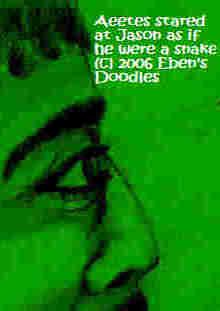

Jason explained, using the trader talk and even some Achaean words when trader talk proved insufficient, that they had come to seek the Golden Fleece that Phrixus, their countryman, had left for safekeeping in their country, or so the account was given to him in his city of Iolkos.
Hearing his, the king frowned, but his daughter--if that was what she was--seemed to be pleased. She leaned close to the king's ear and said quite a number of things, as Jason waited with growing impatience.
What was so strange about this quest of his?--hadn't they expected that someday someone from the native homeland of Phrixus would come looking for him and his Golden Fleece? The four sons of Phrixus? Where were they all? His grandsons were on board the Argo, kept there under the watchful eye of Mopsos, but where was their uncles? What had the king done to drive them away?
Jason thought the king needed more information. "O king," he began. "Do not think it so strange that we have come to your great country! I went to my own kingdom to claim it, where my uncle ruled for my father, and he offered me this wonderful adventure, and I took it, since I am young, and it seems hard for one of my few years to sit so long in a chair, day after day, even if it is golden and it is a king's. Can you help us find the Fleece of the heavenly ram? We will go in search of it at once, and cease to be a burden to you!"
Now it was the king who looked pleased, and the young woman at his side looked just the opposite.
Surprised, Jason decided that he would never get used to these changeable Colchians and their swift turning currents of mood. He waited for their answer, and it was the king who spoke next.
"You are welcome, foreign prince! Of course, you all must first bathe and be feasted properly, before you go forth to gain the Fleece! You are my honored guests! But when you take your leave, I will then tell you a few, little tasks you must perform first to prove yourself worthy of the Fleece. If it is so valuable to you, surely you will understand that it must cost you something to win and possess! The Fleece is not freely given. What treasure comes without price, unless it is stolen? To prove you are not thieves come to rob my kingdom, you will first prove you are honorable men at heart and do the things I request, which should be slight tasks to the likes of you. We cannot let just anyone, particularly strangers like you, to tread anywhere you please in my kingdom. No! But once you have proven yourself worthy by paying the price I set for you, then you can go forth with my royal favor and the speed of the gods! Is this acceptable and fair in your eyes?"
All the eyes of the courtiers and counsellors and the guards were fastened on the One-Sandalled Champion, to see how he would respond to the outrageous demands.
Jason felt very uncomfortable, unable to comprehend the full extent of the demands in the first moments. What did they know he did not know? Just what were these "little tasks" anyway? How could the king presume to put a price on the Fleece? Did it belong to him? Phrixus had sacrificed the Golden Ram of heaven--so the Fleece had come from heaven's kingdom, not this barbarian king's! How could this man presume to set his price on a heavenly ram's fleece anyway? But what choice did he, the suppliant, have? He was a royal guest, along with his crew, whether he liked the idea or not.
He bowed, and replied: "You are most gracious, O great King! If you must set a price on the Fleece, we will attempt to pay it with full obedience to your wishes. May your gods favor you in return!"
The Argonauts were led away by palace servants to their quarters, and there they bathed in fine, Ilian bronze tubs filled for them by palace men-servants with scented, warm water, and were given fresh changes of clothes fit for princes. Returning to the hall, they found it set with banqueting tables all prepared for them. The banquet began, and continued until late in the evening.
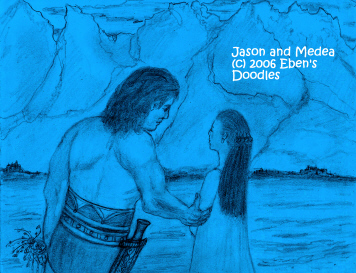
Jason was surprised--just now hearing that this high-spirited royal princess, whom he found fascinating and strong in mind like a man, was part of the royal prize he was seeking to win.
She went on, more rapidly, though still keeping her voice low. "Don't mind my father. He is jealous of rivals of any kind. That is natural for a king of his power and wealth. He will not try to kill you right away now and will set some tasks for you, but I will help you if I can--whenever I can."
That was all she could tell him, as too many people were looking at them and whispering to each other with knowing smiles. Jason stared at her as she broke off and left him by the wall where she had stood many days looking out to sea for the coming hero with the one-sandal.
In the morning, after they had slept in the down-soft beds, they were greeted and brought back to the royal hall. Here they found the king prepared for them, but his daughter was not present. The military men--who all looked like generals--stood stiffly on each side of the king. The whole air of the audence had changed from that of host with his honored guests to something like an audience a suspicious king would have with an untrusted ally or the envoys of a treacherous, neighboring kingdom.
"Prince Jason, you must complete the tasks I assign, before I let you launch forth on your quest. These are my little labors. First, you must bend a certain bow of bronze and string it. It was the bow of Herakles who was said to be half a god in his strength and prowess, if not his intellect! Nobody has been able to do it--not among mortal men. The second task will be to sail your ship backwards up the river, with your sail furled and your oars turned so the handles are plying in the water, not the blades. Third, you will subdue the bull of Hades that reputedly guards the cave entrance to the underground chambers of the souls of dead men, but you will carry no weapon. Fourth, you will use the bull of Hades to plow the ground, and then sow dragon teeth that I will give you from my royal collection. When the dragon teeth spring up as fully armed men you will fight with you, you must slay them all. When you have completed these simple tasks, you will then face the dragon which guards the tree on which the Fleece hangs. Are you ready to begin the first labor? Or are you like all the others, who proved cowards? If you are a wretched coward, I will personally whip you all the way to the city gates like a dog for wasting my royal favor and dining at my table! Well?"
Jason, his face ashen, glanced at his men, and their faces showed they were equally shaken. "O king, you ask some difficult things of us. I must go and seek the open council of my men freely. Why do we do this? We are free Achaeans--bound by our customs and laws, which were granted us by our forefathers. They met in these free and open councils, and kinds were silent in their midst, while all others spoke whatever was on their hearts, without fear of punishment. It is our ancient Achaean way, and it is good, lest our kings and princes become tyrants over us after all good counsel fails to reach their ears. Will you give us a day to decide? It is a difficult matter."
The king's face grimaced, and he seemed not at all pleased about the Achaean custom of seeking wisdom in open, free councils, but he was anxious to hear the decision, and so he signalled that they could do so, but he said that if they were delaying him just so they could runaway--he would send his mounted soldiers to catch them, and then it would be the prison for their likes!" Jason and his men, shown out of the hall, were wide-eyed. This king was everything they had been warned. But he was even worse! No king on earth would demand such things as this king demanded! What were they to do? They could not hope to outrun the king's horses and chariots. They walked back down to the ship, and then held their council as free Achaeans do since the time of their forefathers.
The men pleaded with him. "It's all clearly impossible!" they cried. "Yet we are strong and brave and are able to fight this wicked, unjust ruler," Boreus said, speaking for the others. "At least let us fight manfully, and die honorably as free Achaeans! We will not let him put such impossible tasks on you to crush you and defeat the Quest set deep in your heart!"
Jason gazed at the men, and realized that he had to save his men, even if he were not saved and his dream perish with him. As for Mopsos, he remained silent, with no opinion expressed--Phrixus's grandsons leaning against his mighty shoulders as they would with a loved big brother or their father.
Finally, when no one offered anything else, Jason stood, and the council ended. "No," Jason shook his head, "I must attempt them. There is no other way for us. He will kill us all if we do anything but what he has demanded. At least, it will be only one death, mine, rather than all yours. You will remain here, with oars, swords and shields, at hand, and if I fail, you must get away at once the moment you see his soldiers running to capture you! I think he will not strike you too, but if he tries, you must not stay and fight so many as he has, but sail at once out of this place! The river's current is swift, your arms are as strong as your oars, you can outrun them to the sea! That is my decision! What say you?"
The men all stared at him, speechless. Then, one by one, they nodded with great reluctance. And some of the men wept--they knew this was probably the last time they would see their great, one-sandalled captain alive.
Jason went up to the palace unarmed, for his strenth was his chief weapon now. The king and his court and daughter sat in a high pavilion above a pavement where Jason was led out. He was handed a bronze bow reputed to have belonged to Herakles, too heavy for an ordinary man. Made of all metal, it was unbreakable but would be useless in battle, for it would defeat the arm of any bowsman who tried to bend it.
Having switched his sandal to his left foot, he used that foot to hold one end down, while he put his arm over the other and pulled down hard. It did not bend.
Jason began praying silently. He tested it again, and still it resisted his strength. Truly, it was impossible.
He was facing his own sure death, he knew, when the king exacted the full punishment for his failure--as this cruel, barbarian king naturally would.
Jason began to think hard and fast. Defeat and disgrace were staring him in the face, like the dread faces of snake-haired Medusa and her sisters that turn a man to a stone, petrifying him with one look at them.
He was sweating hard. He had to wipe his hands off on his loin cloth to get a tight grip on the bow. Then it came to him--words he had heard Orpheus and also Mopsos and his father say, and other things too that spoke to him. There was a God above all gods, who was Almighty! This Most High God had grown unknown to the far-sailing Achaeans, because they grew darkened in their minds and began to prefer the many gods of their neighbors with all their feasts, revelry, and evil sport rather than the holy, pure worship demanded by the Unknown God of their forefathers, the One Who dwelt in unapproachable light.
To this true, holy God dwelling in pure light Jason turned in his desperation. "I will belong to You, Holy One of my forefathers, if you will help me now in this impossible task! Grant me mercy and the needed strength, I pray!"
It was a simple prayer, but utterly sincere. He did not expect a lightning bolt or a clap of thunder or a chariot with horses descend out of the sky. He felt nothing, in fact, that could tell him that this God had heard his urgent prayer and surrender.
As the king was growing restless, he gave orders to the men to strike Jason with the flat of their swords if he delayed any further.
But Jason did not wait for that humiliation to be dealt him--a prince of a royal kingdom of heroic-hearted men just as great as any high-towered, gold-rich Colchis, in his view! He grasped the arms of the bow of Herakles, applying all his strength. He felt nothing give in the bronze, and pressed on it all the more, and still nothing! He gave it everything he had! His heart was beating furiously, as if to burst! His fingers and knuckles whitened, and his chest heaved, and every muscle and bone stood out on his body. The bow refused to surrender to all the violence of his strength and will!
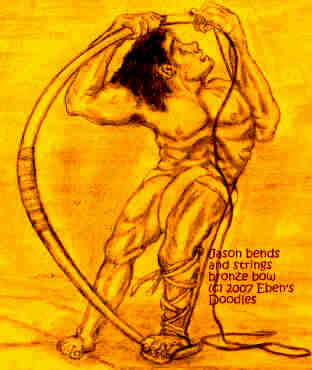
Giving a cry of anguish, Jason was about to drop the bow and accept a miserable end at the hand of the king when a surge of power nearly knocked him off his half-bare feet. The bow nearly snapped in two as he held it in his trembling hands while the Power coursing through him did its work for him. He quickly strung it, hoping the divine strength would last long enough. It did. He strung the bow, and then stepped back, raising it high and waving it. The crowd roared in surprised approval. When he took an arrow from a quiver held out to him, he drew the bow and the arrow shot through the air with such speed it struck the target, one of the high fortress towers. Men ran to retireve it. They came back, shouting that the arrow had passed completely through, piercing two stone walls as if they were butter! And the arrow had continued on, not dropping to the ground, for there was no sign of it!
The whole gathering was thunderstruck at the news. Hundreds of Colchians jumped from the stands, running to mob him, hoisting them on his shoulders and carrying him around the viewing pavement in a victor's parade.
The king rose, looking very disgusted, and his daughter, looking very pleased, went with the king to present Jason the One-Sandalled the gold-leaved victor's crown for completing the first task successfully. Intricately figured, gold bracelets fashioned in Ilios were clamped on his arms and ankles as well, but he took the splendid trinkets off and gave them to the poor in the crowd.
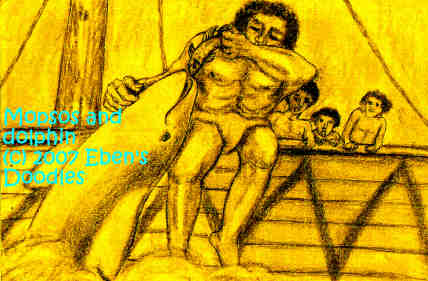
Mopsos, in his boyhood, had trained a dolphin once to pull his little fishing boat--with a rope halter he had made for it. These dolphins of the river, he reasoned, could learn the same trick. If they were given enough tasty fish treats, that is! Once they thought they would be given rewards for any task, they were eager to do them! Otherwise, they were so free in spirit they could not be made to do anything--and were like Achaeans, in that respect--a life and liberty-loving people who did not take kindly to tyrants and their suppression of freedom and mistreatment of the poor farmer, the widow, the elderly, and the honest wayfarer.
In the hours he had before Jason's test with the bow of Herakles, Mopsos had already made friends with six or seven river dolphins who quickly responded to the names he gave them. There were others too that were drawn to the free fish he offered them--but they proved too wild and wary for him to tame.
But Laugher, Ox-back, Darter, Flier, Water-walker, Flip-tail--they were the sweet cream of the crop! Such jolly, big fellows, it seemed it was their joy to try to please him. Stroking their bellies, his six dolphin friends came again and again to him when he, or his adopted sons--as Phrixus's grandsons were to him--called their names. Dolphins learned very, very quickly, with hardly any practice. They were so bright they seemed to anticipate what he was going to teach them. Soon he knew that they would take the rope halter and pull the Argo itself, being such powerful swimmers they equalled many strong oarsmen. But could they pull the ship against the racing, snow-fed currents of the deep-channeled Phasis? That remained to be seen!
When the king was settled in his grandly-tapestried royal pavilion on the wharf, and a golden trumpet was blown, it was the signal for the Argonauts to begin the rowing. Jason's Argonauts put all their oars into the milky white, muddy water, handle down, and among them were six that had halters already being nibbled by the six hungry dolphins Mopsos had trained. One by one, they accepted the halter, after being given a tasty fish. Now the Argo was ready!
As Moposos threw a fish ahead of each group of three, they started off, pulling the ship into the river.
The king, fully expecting to see the Argo drift backwards helplessly as his oarsmen flailed futilely with their oar handles, saw the ship move forwards! He was astounded. Could his eyes be mistaken? Then one of his courtiers, sharper of eye, informed the king, "They have trained the fishes to pull the ship, Your Majesty!"
"Impossible!" cried the king. Yet it was the case, which more and more of his court saw for themselves.
"The Argo continued upstream, pulled by the powerful dolphins, while Mopsos kept throwing tasty fish ahead of them to reward them for their work.
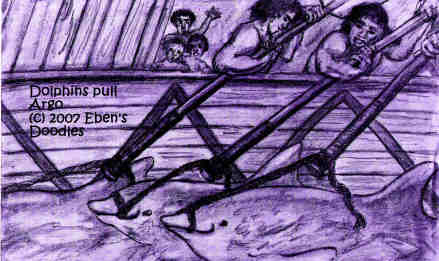
When Mopsos ran out of fish, Jason called a halt. He had his men put blades in the water, and the ship quickly returned to the wharf, his men shouting in triumph. The king was flummoxed. He could not think what to do or say against it. After all, he had set no provisions, not imagining that the Argonauts would train the river fish to pull the ship upriver against the current! He soon realized, after looking at his speechless counselors, that there was nothing for it. With a crowd of townspeople now gathered, cheering for the Argonauts, he could not countermand his former demand.
With ill grace, he crowned Jason with his second crown of golden laurel leaves for his victory over the river, while his daughter, who had arrived late in a golden litter with her own entourage, smiled and gave the champion a jeweled ring from her finger, which he kissed and then handed to Mopsos to keep for Phrixus's grandsons.
The king, seeing her hand over a ring to a foreigner he had given her on her birthday, was almost beside himself--but though he was visibly shaking with anger he controlled himself enough not to let his angry words fly. He knew better than to cross his daughter's wishes at this point of the ceremony--who knows what she might do to disgrace him before everyone present? He dared not risk her anger, as it was too much like his own for comfort--and he was not sure who could get angrier. She still had not got over her mother's death. Her mother had been a beautiful woman, but apt to use poison potions to get rid of her rivals. One--a barbarian girl he had since got rid of--had got to first. Now her daughter might be inclined to try the same things--and so it was politic to try to keep in her good graces if he could manage it.
The only thing that sweetened the king's sour countenance a bit was the thought that the next labor was even worse. Jason and his men could laugh all they like now, but soon they would be wailing, and begging for his mercy, which of course was in short supply in his kingdom, when it came to upstart strangers like this one-sandalled voyager from Achaea! Let his wrestle with the mighty horned bull of Hades and see which was the greater in strength--a mere man, or a bull that was as big as a house and able to breathe scorching fire through its flaring nostrils? No man had dared such a thing and lived!
Jason would not only have to subdue Hades' ferocious, man-killing beast but he would have to make it submit to a yoke so Jason could plow a field he would sow with dragon's teeth. When they sprang up as fully armed warriors, he would have to slay them all, before he would receive another crown. All that was, of course, utterly impossible.
Hahaha! the king chuckled to himself, as he mounted his chariot and rode back up the road to his palace to get the dragon's teeth from storage, which the gods had given him on their last visit. This one-sandalled prince was a dead man! Hahaha!
The old herb woman was where her mother had taken her once, busy at her trade of preparing love potions, and even potions to get rid of unwanted husbands and unwanted wives or rivals of wives. It was a good business, and she never lacked for patrons. Not at all surprised the late queen's daughter would come alone, she heard her request, and knew exactly what would do. The spider leaf plant was the most potent in the world of herbs. With a leather glove, she gathered a few beans and leaves of the plant she grew outside the abandoned royal kitchen, now a ruin, where she lived and worked.
Soon she had it worked in a mortar with a pestle into the paste required.
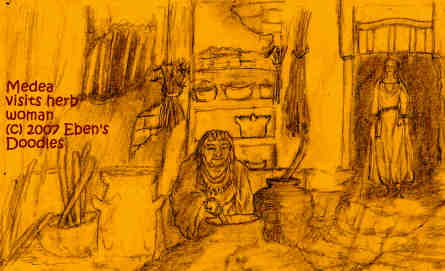
"A little more, perhaps, and it could kill the beast on its feet. Dab this amount I give you on a bundle of provender for the beast to eat--and soon it will collapse. When it awakens, it will be docile, unable to fix its mind on you as its enemy, so it will not rush at you to kill you. You can do anything you like with this beast as long as the herb's strength lasts. After the effect passes, the beast will turn and gore you if you tarry."
Medea paid the woman a gold coin, and the woman was all smiles--she had not been paid so royally since the queen had been her frequent customer in former days.
"Now, Your Majesty, please be very, very careful with the potion. It must not touch you, or you will die a horrible death! It is so powerful an herb!"
The herb woman scooped the paste into an earthen jug, sealing it with a stopper,then handed it to the princess.
"Only pour a little water in it, and you can pour it out on the hay for the beast you speak of. But if you get any on your own hand, you will die! Throw away the jug at once."
She herself cast the utensils she had used away--including the mortar and pestle and the glove she had used to gather the herb.
Medea took the spider plant bane and narcotic straight to the royal wharf. She was fortunate, she found. Instead of the usual gang of talkative, lounging boatmen and traders, with a customs man or official from the palace dealing with them, there was only a fisherman or two casting a line from the wharf, more intent on getting their catch for dinner than anything else.
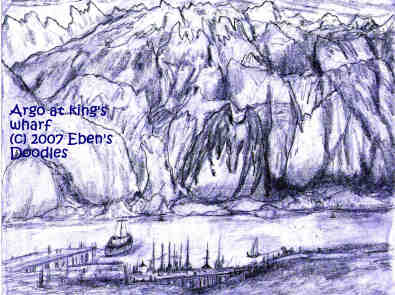
He was happy to see Medea's face, however, as she pushed back her head covering--surprised as he was that she would come in person like this, wearing a commoner's clothes.
Medea did not waste time on herself as Jason and his men pulled the mooring line, and they drew up close to the wharf. Jason climbed out on the wharf to speak to her in private. She walked away a few paces, then turned around to face him as she held out the means for overcoming the bull of Hades. She explained everything about the potion, and how careful he must be with it.
"This will make the beast do whatever you want it to do. It is the only way. Otherwise it will kill you! That is why my father set this impossible task on you--he knew what this bull would do! Will you use the potion?"
Jason took the jug. "Yes! I will do with it as you told me."
He thanked her, but she did not give him any more time to say more and hurried away.
Jason watched her go, sighed, and then turned back to the business at hand--the Third Labor! This was a most dreadful task the king had set for him!
His Argonauts fully expected not to see him return from the cave of Hades. But where was the cave entrance to the Underworld of the Dead?
Jason did not want to call on any of the king's men to guide him to it--lest the king use them to thwart him in any way. He would find it himself, perhaps using local people's advice if he could get it. Surprising him, however, they fell silent when he asked the tradesmen in the port when he went to buy the provender for the bull. Normally, they were talkative, but not on this subject!
There was nothing for it, he would have to set off walking, and find it himself if he could, without help.
With his Argonauts following, carrying the rake with the bundle of hay for him, Jason set off, not willing to delay the Labor any longer.
After they left the city gate leading to the mountains, he came upon many farms, then further out, on the slopes of the mountains, flocks of sheep. It was so warm and luxuriant below the slopes, but on them the herbage quickly thinned out to grass and small prickly shrubs. Here a shepherd boy ran right into his path. He was very frightened. Evidently, he had been chasing a sheep that had bolted.
Jason caught the boy in his hands before he could get away.
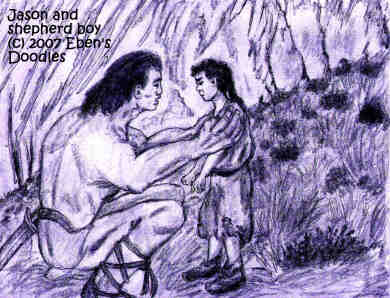
Jason pointed to a bull in a pasture further down the slope. By degrees he got the boy to understand that the bull he sought was under the ground, not on it. Finally, the eyes of the boy gleamed with understanding, then, terrible fear. He struggled to get away all the more from Jason's grasp. Jason took out a gold piece, and the boy stared at it with big eyes and stopped struggling.
"Oh, so you know the value of this, do you?!" Jason laughed, and his men laughed with him. He handed it to the boy, while indicating that he was to lead them to the bull that lives underground. The boy, grasping the gold piece with his teeth, set out gladly, letting his sheep tend themselves for the time being.
The boy practically ran the whole distance, and the men were hard put to keep up, for the boy was as nimble footed as a goat on the steep slopes and the rocky sides of ravines.
He knew just where to ford streams that plummeted out of the snows and ice far overhead to fall upon the slopes far below. He knew the entrances to all the major caves in the area too, and he lead them to one, stopped, smiled and pointed. Jason undestood. This was the one he sought!
The boy darted off, and Jason did not have a chance to thank him.
The Argonauts peered in. It was a vast cave, and even though the entrance was narrow, they could see there was no limit to it. How would he see when the light of the outside world failed him?
He hoped that he would find the bull where there was still enough light to see it. That was all he could hope, for he had not thought to bring torches. And he could not carry them anyway. He had the rake and hay, the jug, and his sword and shield. His Argonauts wanted to accompany him, and carry everything, but he refused.
"Return to the ship!" he said to them. "You must all guard it for my return. We must not lose our ship. Please go at once!" The men were most reluctant, but Jason did not give them an opportunity to try to dissuade him. He left them and entered the cave. Within moments he and his Argonauts had lost sight of each other.

Becoming very wary, he proceeded slowly.
It was good that he was taking his time, and was quiet, for every stone that was kicked made a noise that repeated itself almost endlessly in the vast chambers of the cave.
He finally saw up ahead a huge mass he thought was a big, solitary rock. But it moved! And when it turned, it showed its horns.
Jason froze. He did not move even an eyelid. The monster bull was bigger than he had even imagined.
It slowly walked away from him, and Jason was able to breathe again. It had not seen him! Evidently, he was so small, it had not seen him in the dim light, or maybe he seemed nothing but an ant to it.
Jason, laying down the provender, took the jug and pulled the stopper. Carefully, he applied the potion to the hay and straw, then he picked up the rake and carried the provender as he followed the bull from a safe distance. The bull finally stopped, swung its head about a few times, then sank onto its haunches, before laying down on its side. It was going to sleep!
This was Jason's chance. He waited a while, then as quietly as possible carried the hay to the bull, laying it down where he thought the bull might see it or come close to it when it was again on its feet.
Then Jason went to the rock walls of the cave, and hiding himself between the huge boulders, waited.
The bull rolled a couple times in its sleep, snorted, flexed its tremendous legs and hooves, then returned to its slumber. Jason also slept, thinking it would be a longer time, and he might as well rest too.
When he awoke, it was suddenly, at the sound of something huge, like an avalanche of rocks, falling into the cave with a thunderous roar. He looked out, and saw only the bull. It was lying on the ground as before. Had it?
Jason had to risk it to find out, but he had to know. He crept as quietly as he could toward the bull. He got right in front of the monster, but still the bull gave no sign it knew he was there. Then Jason saw it had eaten the provender, including the rake!
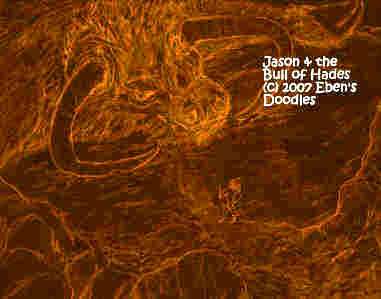
Jason followed, and when the bull quietened, still under the effect of the narcotic, he took the hair rope he had made of the bull's own tail hair and, attached to the hair of the beast's head, he led it like a docile lamb.
The astonished Argonauts watched as Jason and the bull continued on down toward the lower slopes. Jason did not dare pause to explain. He did not want the potion to wear off before he had completed the labor. Yes, he had subdued the beast, but he had to plow a field, then sow it with dragon's teeth provided by the kind.
But first he had to get it and himself safely down to the lower cultivated slopes.
"I need plenty rope and a plow," he called to the men. They understood, and some ran for the rope, and others for a farmer's plow from the nearest farm.
The men going for the rope from the ship met Mopsos. That man had seven eyes in his head, it seemed, and seven ears--how could he have known and seen Jason's need? But he did! Grabbing the rope, they ran carrying it up the slopes toward the highest fields.
When Jason and the bull reached the first fields, the rope and a plow were waiting for them, and he shouted instructions as the bull kept moving along, Jason not able to stop it. The ropes, wound around the horns, then were pulled back over the monster's flanks and Jason hitched them to the plow as Argonauts carried it. They dropped it, and he was off, plowing!
It was a deep furrow, if not very straight.
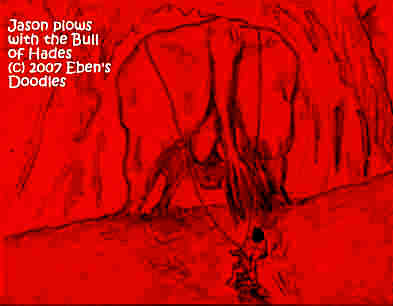
Would it notice the danger and turn back? Jason wondered, holding his breath. No! It continued on over. Then, losing footholds in the loose scree of the rock, it began to thrash with its legs. But that only made things worse. Wakening now to its peril, it snorted and roared, but there was no stopping its momentum. It began to tumble, head over tail. Then, incredibly, as the Argonauts looked over the cliff edge with bulging eyes, the bull of Hades went airborne, its leg flailing helplessly.
Down, down, down!
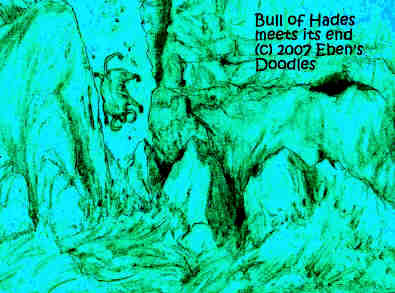
Jason turned back around, shocked but vastly relieved. Wondrous monster that it was--some said it was the ox bull of Herakles, that he used to plow with--it had to be killed this way, he knew. If it had continued to live, it would have killed him and the Argonauts, then go on to the villages and even the city and destroyed everything and killed everyone. But that wouldn't have been enough. It would have done the same to all the inhabited earth. Nothing could have stopped this monster as it rampaged across the wide earth.
Jason looked round at his wide-eyed Argonauts. How fortunate they all were, he thought, that Medea's potion had not worn off before they could send the monster over the cliff!
But there was no time for celebration. He had a task to complete! Already news of the plowing had no doubt reached the palace. It would be impossible for news like that to be kept back from Aeetes, for the king's hired eyes and ears were everywhere in his kingdom!
It was so as Jason thought, for as he entered the palace, the very mood of the place was even more hostile than before--an indication that they all knew he had completed the impossible task of subduing of the Bull of Hades and also the plowing successfully.
The king sent word before he could reach the royal hall--he was to follow a guard, and he would be taken to a place for a private audience.
Jason followed the guard, and was led into a dark chamber. Only the king and a guard were present. The king went to a huge wooden chest, which was locked. He took an enormous bronze key, with many cut facets and teeth to it, and opened the chest. Removing layers of gold-threaded cloth, he bought out the first dragon tooth.
Jason could hardly believe what he was seeing.
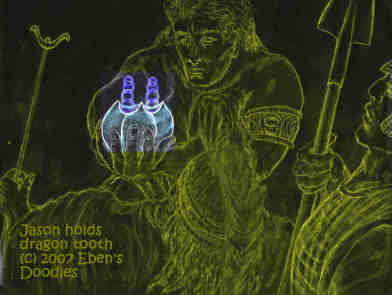
The king laughed at him. "It was given me by the high gods who keep the dragon in their palace zoo. They left this one, and others, in my keeping. If I ever need their aid, they said to me, I only have to bring them out, and sow them in the open field, and they will immediately draw armed men out of the air. I have not needed any such help, for I have plenty armed men of my own, so you will be the first to use them! But the soldiers that fly down will not recognize you, perhaps, and fight you to the death! We shall see!"
After turning the dragon's teeth over to Jason, the king left without another word. Jason felt a chill holding the crystal dragon's tooth, but there was no turning back now. He took it, and the others, in a sower's burlap bag, and left the palace.
As an airman swooped at him, Jason let
his shaft fly, and being an expert, he caught the airman, piercing the
transparent shield in front of him.
The other airmen, seeing it, halted their attack, and a moment later they vanished
back whereever they had come from. Jason was alone--alive, and victorious!
It was time to celebrate! The Argonauts rushed forward, hoisting him on their shoulders,
shouting as loud as they could, and the sound reached the nearest village, and the
people ran out, wondering what was going on. They soon heard, and they too began
shouting for joy in his victory, heedless of the king who hated Jason the One-Sandalled with a passion.
Jason went in triumph to the palace. This time the whole palace turned out to view the
champion and his splendid, young men. No man alive on the earth could claim such exploits as Jason's, everyone knew. He would be famous forever--and his glorious deeds, done in Colchis, would rebound to the fame of their country as well. Everyone, except the king, was
full of joy.
The king himself had to show himself to the jubilant crowds that streamed up to join in the
event.
There was no stopping all this festivity now. The king had to declare a state banquet with all the trimmings, at which to award gifts to the victor worthy of a great king and worthy of his great kingdom, and despite all he had tried to do, the victor was the One-Sandalled and his mariners.
His daughter too, was a part of the awards. Word reached her, and she was
very pleased, indeed, as she could not wish for a braver and more handsome mate than
this Jason of the Achaeans. Jason was, in fact, just what she had ordered from the gods! Hadn't she given a rich present of gold--seven royal serving plates of solid gold a servant could hardly lift and the hearts of four slaves--to the goddess Hecate in her hidden, valley shrine, for aid in securing such a husband as Jason would be to her?
She sent word she would be not be coming down to greet him, but she would give him a gift too.
The Colchians understood why she would not attend the royal banquet--that was not her place as a bride to be, as she would need to prepare herself and her maids for the
wedding.
Of course, everyone understood too that this was not her chief reason for her doing it this way. She was a royal princess, full of
her pride of station, naturally. Colchians, being half-barbarian to put it kindly,
had known many a woman who fancied herself a warrior on equal with any man--or, if they were too small in body, at least their equal or even their master in her wits. Medea was one of those in the latter case.
No man she had met had matched her wits. Submission to a man, then, was going to prove hard for her--no matter how much the One-Sandalled attracted her. Jason, on his side, was content to wait for her when she would
be his, at some grand wedding ceremony--and it didn't have to be grand to suit his simple tastes. But what of the greatest prize of all--the Golden Fleece? Would he postpone seeking it to be married? Most men would do that--preferring love to war. Everyone wanted to know what the groom's desire was.
"I will take the gift of my lady," he told them, "and then we will launch immediately, to go and win the Fleece of the heavenly ram before I return to take my lady and wife."
This greatly disappointed the crowds, who desired to see the wedding first, but they had no say in it, and Jason's decision did not displease the king, who did not want the marriage at all, and hoped Jason would be slain by the fierce dragon that jealously guarded the Fleece, never sleeping it was said, with eyes forever open and watchful.
He had asked the Colchians, great and small, of the Fleece's whereabouts--and
got nowhere with them. He concluded that they were either ignorant and did not know, or they were too fearful of the king to tell him, a stranger and a foreigner.
He does not ask the king, the one person who would know for certain--rather than
be lied to or told someplace that would surely be his death and the deaths of his crew and the ship too.
He inquired at a temple of a certain local goat-god, where the most ancient accounts were reputedly kept in safety. The priests who served as librarians, even with a gift of gold, could tell him precious little beyond what he could already guess. They spoke of gods coming to Colchis, even up to
the time of their king's first years of reign--flying in strange chariots the shape of
tear drops or tongues. The gods had left certain treasures with the king to keep until they returned--though they could not describe them--having never been permitted by the king to gain access to them.
Keeping quiet about the dragon's teeth, Jason went back to the ship. What did he care about the strange gods anyway? They had nothing to do with what he was about to
seek, he thought. But on the way to the king's wharf to board his ship, he paused in the gathering of buyers and sellers who congregated in the area before the royal guards cleared them away. He asked a couple traders talking together where the Fleece of Phrixus might be located.
At first they looked to see if any of the royal guards from the palace were
in hearing distance, and seeing it was safe they told him what they knew. It was stolen and taken out of the country by the foreign Achaean, Phrixus and his four sons, they told him. They had abused the trust and hospitality of the king and taken the
treasure secretly away in their ship by night. They shrugged--such was the way of
greedy foreigners!
Jason was not at all pleased with their lies and idle talk--but he kept control of
his anger. "What then has happened to them?" he inquired. "Did they reach
their homeland with the treasure?"
They nodded, smiling and showing their gold teeth. "Assuredly! They are now
boasting how they got away with the treasure right under the king's nose! They are
feasting and dancing and having a jolly time at our expense!"
That was enough for Jason's blood to start boiling--the very idea! They made Phrixus and his sons to be nothing but base robbers and sneaks! His mighty arms itched to grab the three liars and bang their heads together, but he held back, certain he might
kill one or two.
He turned away, as if sorry to leave their entertaining company. "You wouldn't happen to know something, good sirs?" he said. "Such noble fellows as you would surely
know it."
Their interest up, they fell right into his little trap. "Of course, we would--what is it you wish to know, good prince?"
"Oh, where are the forests that hold the tallest, biggest trees? I may need a new mast, that's all."
The traders hastily vied to supply the information, to prove which one of them knew Colchis best.
Jason soon learned the locations of the major forests, renowed for trees that scratched
heaven with their house-thick branches and seed cones the sizes of pregnant ewes. There was one found along the southern coast, where no cities thrived, but where the brigands and robbers flourished. Then there was a swamp toward the north, full of fevers, however--also little visited by people. And a third great stand of trees sprang from the headwaters of the Phasis, the stream that watered the orchards, fields, and vineyards of Aea and her surrounding villages. This forest, they averred, was the most dangerous, since it was full of deadly snakes and magical, enchanting groves where men ventured to their doom.
Thanking the men, who congratulated themselves on their wonderful knowledge of their
country, Jason went to the ship. He knew all he needed, thanks to their
loose tongues.
As he climbed aboard the Argo, carrying his sower's bag with the rope made of the tail hair of the Bull of Hades in it as a momento of the wondrous monster, he was met by Mopsos and the
waiting, excited crew. Jason did not waste time but went to make his last
inspections, noting whatever was still lacking or unfinished.
Strangely, he thought of Medea's offer of a gift. She had not given it--had she forgotten? Even as he was thinking this, a courier ran down the road to the king's harbor--his gleaming green and blue headdress of peacock feathers and sash of gold announcing that state business was soon at hand.
But why not a chariot? Jason wondered, watching the man. Ignoring the royal guards at the king's wharf, the man went straight to the side nearest where the Argo was moored.
Giving orders, Jason had his men use the oars and pole the ship up next to the dock, so the man could speak more privately to him the king's matter.
He was mistaken. "A gift from the princess royal!" the courier said to Jason. Jason, leaping to the dock at once, drew the man aside.
"She commands that you tell no one--or you will not receive it."
"I will do as she wishes," he replied.
The courier then brought out of the royal bag he carried a golden casket. He handed it to Jason. Jason, not sure what to do with it, put it inside the cradle of his arm. "I have no proper royal gift as yet for her in return," he said. "Tell her, my gift will be her sight of the Golden Fleece of the Heavenly Ram!"
"Prince Jason, I will tell the princess exactly as you said," the courier replied.
The courier saluted in the Colchian manner, and ran off, again without stopping to speak with the palace guards who made no move to detain him.
Jason watched the man recede up the high, winding road, and then climbed back aboard the Argo, giving order to move it away from the dock and pull the mooring line.
He told no one but Mopsos, as the men were all busy, the preparations going forward
to launch the ship. Mopsos had somehow even got hold of mops and the deck and
plank seats were being given a last scrub by him and the others. What a man for cleanliness, as if cleanliness were next to godliness! Jason thought, amused. Most Achaeans were fastidious, but not as fastidious as Mopsos, who couldn't stand a speck of dirt if he could help it.
Going to the bow where he could sit, Jason held Medea's gift in the crook of his arm, and then, when it was the time, he drew it out and took a look at it. He had no idea what she had given her. Gold? Jewels? What would he do with them? He opened
the casket, which was of Ilian manufacture, fitted with fine golden hinges.
Inside he found a lock of bronzen, reddish hair--Medea's? he wondered, surprised.
He touched it, and it was so fine--the softest hair he had ever touched, for he was
so used to coarse Achaean hair, that grew thick and dense like sheep's wool, only
jet black.
The fragrance in the hair met his nostrils as he gazed at the lock of hair. For a moment he had never smelled so wonderful a scent--it was like a wildflower's, with
something like pine resin added. He closed the box--but the scent stayed in his
mind--he felt bewitched by it, his senses almost drugged. His whole being seemed
captivated. He stood up, almost unsteadily, grasping the upper rails of the bows for support. He glanced up toward the palace, searchingly, as if he could see
her at such a great distance.
Jason's eyes widened. What was that fluttering from the topmost tower of the palace? A long, red ribbon! The palace had many flags and banners, but this ribbon--it was
alone. Was it Medea's? He was certain it was.
Excited, still intoxicated by Medea's lock of hair that had ravished his heart and soul with the very scent of it, Jason climbed up the mast, pulling off a banner. He waved it, back and forth. The ribbon he saw fluttering from the tower, as if in reponse, was dropped. Falling, falling, caught by the wind, streaming this way and that, the
long ribbon looked like a gleaming, red snake in the air. It was a strange sight, drawing the attention of the busy crew, who stopped to look at it as it drifted
down toward the ship.
It was not likely to fall within reach, yet it did so--a miracle in itself--coming to rest on the king's wharf. Jason was first to retrieve it--and then wrapping the lock in the ribbon, he put the casket, ribbon, and lock of hair carefully away in a good place for safekeeping.
Before dawn, well before the first light when people normally arose to start a new day's labors, Jason rose and the ship glided forth under his command, silently as a night-flying bird.
Scarcely dipping their oars, the sail doing the work for them, they moved upriver, quickly putting the king and his palace fortress behind them.
Jason gave the palace-crowned mountain scarcely a glance. It was almost completely dark anyway, with only the guards going the rounds on their patrols. Would they see his departure and report it immediately to the king? Yet he knew he would still have the advantage, even if the king sent a ship to do him mischief. Full light was coming soon, and he could not be caught by surprise.
The king, high in his tower sleeping chamber, heard the report of Jason's swift, early departure. Cursing the spies for not informing him earlier, when there was still chance of creating some difficulties for Jason, the king had to be content with the
knowledge that Jason was headed upriver. That meant his doom, he was fully assured.
No one ever went that way and returned to crow about it!
Even as the king shook the curtains of his canopied bed with his snores, Medea was at the king's wharf.
She had ordered a ship made in Ilios on her design that she had sent with her agents who carried the gold to pay for it. It was shaped like a swan, the royal bird that was found in the king's river, the Phasis.
As it moved upriver in the daylight hours, it drew attention because of its
size and beauty. Was it for a great queen? the people who saw it wondered? Who was she? Had the king remarried? He has completed his months of mourning, and was surely
going to remarry soon. But what queen would submit to such a cruel tyrant? they
had to wonder. Maybe that was why there were so few women of high rank in Colchis who would even consider taking his last wife's place. And then there was his daughter, whom the people talked about. She was said to be very jealous of any woman who might
want to take the affections of the king, and possibly make him think that she,
daughter of his first wife, was of no account. She was also said to be adept in poisons. How long would his new wife last with such a daughter of the king in the same palace? No wonder the king had remained wifeless for some time after his wife
had gone to the halls of Hades! Such was the talk of the Colchians anyway!
Medea's ship had a special sail emblazoned with the sign of the cattle hides
that, coated with butter, captured the river's gold and made Colchis the
rich kingdom it was.
This swan was a bird of magic in her land--and was supposed to insure good
sailings and good fortune and treasure at the end of them. The crew she had selected, along with the soldiers, sailed it upriver, drawing much attention to the size and beauty of the vessel.
Its sail unfurled, it made its way upriver while the morning light dawned above the highest peaks.
Had they come to look for Jason? The sky chariots were formed like the tongue-shaped ones that had assaulted him previously. But these were larger, and they shot flaming arrows that flew faster than any arrow could, without even using bows.
The arrows struck the towers and ramparts, a dozen in the first flight. Sudden, blinding lights erupted, then rolling thunder as if the world itself were coming to an end. The palace disappeared, enveloped in smoke and jetting fires. The second flight of arrows
sped to their target, none missing the mark.
As thousands looked up into the sky where the palace stood, they
saw what looked like a mountain on fire, spewing smoke and rocks and huge chunks of
the stonework down the sides of the acropolis.
The city was now in real danger, as the inhabitants realized the
avalanche was headed for their city and would arrive in a few moments.
Panicked, with no help possible from the king or his government, the crowds that had gathered in the streets rushed this way and that like wolf-attacked sheep without shepherds, some going back inside their houses for valuables or loved ones, while others--posssessing less in this world's goods perhaps--rushed toward the city gates. Alas for them! The guards were so amazed by what was happening, they were like paralytics--and the gates remained shut, their mighty bronze bars and bolts undrawn.
The fleeing crowds ran right into the gates, and many, many people were trampled.
The rest of the story is not any better, for this was just the beginning of their woes. Aea suffered greatly that morning before dawning light.
Jason, giving swords and shields out, gave the men shore leave, while he and Mopsos and the children stayed aboard to keep the ship safe from any passing robbers.
The Argonauts entered the ruined city, amazed at its size and splendor that was even apparent in the ruins and shattered buildings.
Going up the main street, they came to the marketplace, and it too was nothing but burned shells of buildings and shops. But along a ruined wall of one of the
burned shops was a thatched hut or lean-to. A family, startled to see strangers, came out. The Argonauts set down their weapons, to show the family they had come in peace. The coppersmith and his family were overwhelmed, to see other human beings in the city. Evidently, they had not had visitors for quite some time.
The Argonauts were astonished that the man's speech was akin to the dialect of
Tiryns and Argos. Has this city been a colony of those cities in centuries past? They could make out most of his words, as he lamented the destruction of his city by King Aeetes--whom they had considered an ally and trusted, so that they had invited him to come to receive the city's best welcome in celebration of a treaty they signed, insuring peace for them in exchange for a certain amount of gold, which was paid to him because he had the larger navy and could keep the whole coast clear of robber ships.
What a mistake! the coppersmith cried. The king had come with his warships against them, attacking them as soon as they drew up in the port. The treaty had been a
mere convenience for the king to use to cloud his real intentions. It was his way to
keep his plans from being discovered in time for his victims to defend themselves.
The king made quick work of the city--burning, sacking, looting, carrying everything off they wanted, gold, slaves. They seemed to want to destroy everything--but they left the three pillars at the entrance, perhaps to show that the king had destroyed a great city, which would stand a long time as a memorial to his military greatness.
The coppersmith, remembering his family's needs were urgent, offered for sale what little they had salvaged from the city and their own ruined shop.
As they waited for one of their number to go and tell Jason, so they might have money to pay for the items, they turned to the coppersmith with questions.
"How did you escape the king's men?" they asked.
The coppersmith wiped his eyes, which were full of tears for his destroyed city
and his ruined shop, and told them everything. "I was alone when the others trusted the king and his treaty. I knew something evil would come of it. We were too rich a city and had lived too long in peace for this king to leave us be. I had heard what he had done to othe cities farther off. But my people laughed at my fears. So I took my family and we went up into the hills, and hid in the trees. We saw the city destroyed and burning. The king and his men stayed for days, taking everything they wanted away to the ships, destroying the rest. When they had gone, we were near starved to death. But the city had no food, except that I knew of certain stores, that only the king
had--in case of a famine. It was oil, wine, and grain. We found the storage jars, covered by the smoldering ruins. We had to wait for the embers to cool, and then I
dug down to the jars. I found them cracked, burst by the flames. But one, of grain, was still sealed. We had no wine or oil, but there was grain. We could live on it, until someone came--if anyone would come to this city again. But here you are! The gods have been merciful to us today!
The coppersmith, receiving his payment of gold trinkets and rewards that Jason had kept for some good use, was beside himself. It was enough for his family to
use to move to a far, secure, strong city, and begin again!
"But," he protested to the Argonauts, "this is far too much for a few pots and a basket. Surely, you can't be paying me such a fortune as this?"
The Argonauts smiled, and shook their heads. "No, Jason has given it to you, when he heard your plight. Please do not dishonor him by protesting too much."
The coppersmith fell down at the feet of the Argonauts, weeping.
They pulled him to his feet. "It is Jason's heart that was moved so greatly
to help you. He has a god that does this to him--and he obeys. Please
take and use your fortune any way you choose--but remember Jason, and how he
helped you in your distress, and tell it to your countrymen or wherever else you
choose to go. We will return this way again, in a short while, and if you
have not gone with another ship, we will take you away from here."
Having told him this, the Argonauts departed, returning to the ship. The family they left behind was rejoicing, happier than they had been in many days.
The Argo launched as soon as they returned. Unknown to them as they sailed
upriver, still out of sight, the swanship of Medea's followed. Only Medea's brother, Timpala, survived, and he was with the navy, attacking the city that the widow of one of Phrixus's sons had just fled along with the city's ruler and people.
Furious, when he discovered that the city was a mere shell, with no treasure to
make the attack worth-while, Aeetes's son and heir considered searching for
the escaped king and his people, but thought better of it. The Unfriendly Sea
was far too big, and its coasts farflung and unknown, for him to
hope to find them.
Turning back to Colchis with his fleet, the king's son was sure his father would
be enraged when he returned empty-handed.
Then he had an idea. He would not be set upon by his father's wrath and be humiliated by being sent into exile or even executed. This father still could have more sons--and cared little for the idea of his dynasty at present--as everybody knew. No, on
the contrary, he, Timpala the First, would wrest the kingdom from his aging father--for it was his to
take, was it not? He was the sole heir, if his sister were not considered in a co-regency. She was his only true obstacle, he thought, uneasily.
In truth, he feared his man-hearted, strong-witted sister the more--but first he would deal with his father!
Arriving in Aea, he had planned to proceed against his father with a blockade. He would starve them out--and then his father's royal guards would be easy
pickings. He could cut them down with with his expert hired Persian bowsmen.
What shock was his when he found Aea buried under rubble and rock--and the palace-fortress that commanded the height above gone--nothing but a smoking ruin!
Timpala, so-named by his Mitannian mother, and called Apsyrtus by the Achaeans, was hard put to know what to do with his ruined kingdom and
capital--both utterly desolate and depopulated. Who had done this? He knew his father had to be
dead--which was a considerable relief even in the midst of his loss. It took him some time
to decide, that he had no recourse but see Jason. He knew Jason had arrived,
for his spies had kept him informed up until the attack on his father and
his city and palace. But where was the presumptious, cocky, lion-maned foreigner?
Timpala scoured the surrounding countryside. He even searched Aea's ruins,
hoping to find someone who could tell him something. Finally, he found
a beggar huddling in the ruins near the main sea gate. The man was
near idiotic, unable to make any sense with his blabbering tongue.
Rolling his eyes, spitting all over himself, the man was manhandled by
Timpala's men, which only made him worse.
Timpala tried to question him, but all he could get out of the wretch
was that the One-Sandalled was gone, with a great white swan chasing him. A swan was chasing Jason? Timpala jeered back in the idiot's face.
The man was clearly witless!
Timpala had not encountered Jason's ship in the river, so he knew that Jason
must have fled somewhere upriver after his treacherous deed against his host--for who else could have destroyed his father?--or he had escaped into the Unfriendly Sea--in that case,
he was forever out of reach.
But if he had gone upriver in search of his countryman's Fleece, Timpala was assured of
catching him. His ships were swift, and his oarsmen were the best in that area of the world. He knew he could
catch Jason in a day and a half a day, as the river did not continue long above
Aea.
Leaving Aea at once, for there was no point in staying longer, Timpala and his fleet set out. Jason, he believed, was the one who had destroyed his kingdom and slain his
father. He must be caught and punished with a Colchian-style death, a death so
terrible that even the brutal barbarians on the northern plains, normally careless of human life, shied away from the practice, since
it involved transfixing a man to a big stake, his hands nailed to the
main beam and his hands nailed at the wrist bone to the cross beam. That much pain put to a man disgusted even them--though it did not put off the Colchians from trying it on runaway slaves to teach a lesson to the others.
But at last the struggle was being resolved, with fateful consequences for Earth.
Of late one contender for the throne, though a woman, had gained the upperhand, and her name was
Elektra, with some real claim to the throne through her mother, a higher degree
wife of the last emperor. As this became known--that she was going to
assert her claim with the support of most of the princely-house Atlanteans rallied to her
banner--the other claimants fled--rather than lose their heads to her
executioner after some lengthly sessions of torture.
Now, thanks to Elektra's coming to power--gaining the title, "Speaker of the Royal House," the earth would suffer the Atlanteans taking up
residence by two of the claimants who could do a great deal of harm if they
wanted. Then, if Elektra thought to secure the earth under her authority, she would have to find and defeat the escapees, who happened to be twin brothers. But first she would have to find them. As for the destruction of Aea and its kinglet--that was a trivial matter, comnpared with her consolidating her power and locating
the only two men who could possibly thwart her ascension to the throne.
These theiomorphic eyes that were more like a wolf's and a snake's than human, now fastened on Jason, increasingly curious as to his
activities that had created such a stir back in Ilios, whose spies were carrying reports back to the city's rulers concerning his feats of bravery and strength. Could this little human bug be a threat to her own plans for Ilios and its goddess? She might have to stamp him out of existence with her foot! At the same time, she had to deal with the defection and escape of the Princes Calais and Zeetes! It was vexing to her--she was of a single-track mind, and did not like complexity. Her theory of rule was simple: she was the state, absolute, uncontested, universal. Nothing had any right to dissent in the least from her will. Her will was the will of the Universe. Her will was the only one that could be allowed to exist. Everything depended upon her decisions and desires. Everything! And if there was opposition? She would crush it, annihilate it, without hesitation.
As Jason and the Argonauts stopped to rest, Piros, one of Phrixus's grandsons
took bread hunks and fed a forest jay which had no fear of men and came
right to his hand.
Timpala, hearing she was not coming out of her pavilion to greet him,
considered what to do. Should he order her out? Or should he go to her?
He did not think it wise, on either count. What if he went on board her ship, and
she had set a trap there, archers to slay him the moment he stepped on board? Perhaps she thought the same would happen to her--if she left her ship to come to him?
He could not think what to do--for he knew how tricksome she could be--and
always devised to get the advantage over a man. How he hated the thought of
her doing this to him again--in full sight of his navy! He would be the laughingstock
of the country, if that happened!
After more thought, he decided what to do with her. He would not have to wait for her lover to come--he would attack his sister and her ship come dawn, when they
least expected it. Let them enjoy one last evening and one last sleep! He, Timpala, was a generous man!
Even as Timpala was plotting to kill his sister, his own fate was being sealed, for the Atlanteans under Elektra had not finished with their retaliation on Colchis for killing one of their own and destroying his shuttle. Before dawn, as his men readied their weapons on board the ship chosen to
carry archers and swordsmen, Timpala was up and pacing the deck. He was determined to settle the matter once and for all. This way he would never have to worry about
Medea's claim to a throne in his kingdom--and her poison potions either! Once she was out of the way, he would deal with her Achaean lover, the One-Sandalled! The moment his ship came out of the jungle that covered the river channel up ahead, his ships would pounce on him. They wouldn't be able to fight off as many armed men and ships as he
had brought with him! Jason was finished. And the Golden Fleece? If he had found it, he would not be able to enjoy it--for he would not carry it down with him to the
caverns of Hades!
Hahaha! Timpala had to laugh. All Jason would have to his name would be
one sandal! He had come to Colchis with one sandal, and he would leave and be buried with one! Even a pauper lying like a dog in the gutter of the street had two sandals to his name! One-sandalled he lived, one-sandalled he would die! Hahaha!
While Timpala was enjoying this amusing thought so typical of his kind of humor, arrows sped forth from overflying
chariots of the gods--and they found their mark.
When they left the moored ship and jumped down to the shore of the clearing, they were startled when they saw
a man. This was the first man they had seen in the forest, and he too was just as surprised to see them as they were to see him.
Then the man did a strange thing. He ran forward, crying out strange sounds like
a yelping dog, hopping and then flopping down on the ground, holding out his arms as if to ask great favors from a god come in the flesh!
He had no weapons they could see, so he was no threat to anyone. And his eyes were
gleaming with mingled wonder and delight as he gazed on them, like a child might gaze upon a wonderful sweet his mother had just given him as a treat or reward.
The man looked the Argonauts over, up and down, and seemed not to get enough
of them.
Then he began speaking, and this was the most amazing thing of all to the Argonauts.
He was speaking Achaean! Yes, it was rather barbarous sounding in his mouth, but perfectly understandable.
The wonderful speech of the Achaeans poured out of the barbarian--as the Argonauts
listened with mouths agape.
"Wondrous heroes of the Achaean blood! Welcome to this poor land of the Colchi! It is a
very poor land, compared to yours, but we are screamingly rich in gold, the river brings it down in buckets and cart loads
from the high peaks and spread it for us to gather, all the way to the river's mouth!
But the king doesn't let us keep it--he has his taxes, you know! They grind us back into pauperdom, paying them all--and so the gold is worthless to us, and we must make our living in another way that will run faster than his tax collectors can run. Gold is too heavy to run, so he gets it all--but sheep, and, better yet, goats and chamois, run
much faster--so the king is not able to gather his revenue on them!"
By this time the Argonauts were laughing, unable to keep it inside for the sake of civility. The man seemed to enjoy their laughter at his expense, and he kept speaking all the more.
Jason, however, did not like a man to grovel before him like that, so he put out his hand and raised him up. The man bowed, repeatedly, but that could not be helped.
He seemed to want to show how pleased he was at their appearance--in his simple way.
Finally, Jason put out his finger to the man's lips, and he stopped spouting away.
"Now tell me, my friend, some things. What is your name, and where is your city?"
The man's darting, dancing eyes turned sober all of a sudden. "You will not tell the king, will you, what I said about him? He'd send a man and kill me! Or tax me to death, which would be the same thing, only slower a death! Ai ai ai! Please don't tell him about me, sire!"
Jason hastily assured him he wouldn't mention him to the king. "But tell us your name, and your city, and how we found you in this forest."
"I have no city," the man said. "It once was a city, but it is a dead place now, not even a village any more. There is just my one family living there in our wood-planked hut. Please come, and we will do our best by you, sirs!"
Your name? Jason prompted him.
"Honan," he said. "Honan the woodsman."
"And how did you come to know our speech?"
"Phrixus taught me in my boyhood."
The Argonauts were thunderstruck. Jason shook his head, as if he wasn't sure he had heard the man right. "What did you say?" he shouted at the man.
Honan trembled, and fell to the ground. Then Jason laughed, pulling him up
to his feet.
"We won't hurt you, good fellow! Please tell us how you knew Phrixus, and we will
let you go on your way, after you dine with us, of course."
The man's eyes brightened as food was mentioned, and told them everything. He
related how Phrixus had come to his country and met the king, and the king had
set him up in his high palace, and everything had gone well for a time. The
foreigner had even married a beautiful woman of the court, a royal, it was said.
And he had four sons too--all fine, strapping champions, like their father. But
the king had grown old, and he didn't like foreigners who were growing
in numbers at his court like so many grass sprouts. Who knows how many grandsons Phrixus would have too, and
would one of them want his throne? It was more than likely, in the old king's mind--it was certain.
Then one day Phrixus disappeared, and the sons? They scattered, and their wives
and children with them. As for the Fleece--at this point the listening Jason
could not withstrain himself. His hand shot out and grabbed the Honan by the
neck of his garment, he was so taken by his account.
"Yes, yes, go on! What did the king do about the Fleece! Where is it?"
Honan, helpless in Jason's powerful grasp, seemed at a loss for words for once. Some Colchian expressions tumbled out, that nobody could understand in their group. He pointed, then gathered his thoughts a bit more, and said, "I can show you where
it was last seen--but I won't go all the way--it is too dangerous to do that--you will have to go all the way yourself to see if it is still there!"
"What do you mean?" Jason demanded. "What is the danger?"
The man looked at him as if he were looking at a child. "You don't know? You don't know?"
Jason was losing his patience, he was so agitated by the man's wandering account by this time and how he was breaking off in the most critical parts to confuse everything.
"No, tell me then."
The man sighed, and explained slowly, as if to a small child. "Well, you will surely die! The thing that guards it, it won't let you have the Fleece--and anyone who tries is killed. Many men have tried, but they all die. It slays them--every single one of them!
No one escapes to tell about it. We know they are killed, because no one who goes
to see the Fleece ever returns to brag about it. By the time I became this old, with grown sons, nobody came anymore."
The simple man's eyes suddenly turned tearful.
"I never thought I would see you--as Phrixus promised me I would. When I became old, I doubted him. Then...then here you are--all of you!"
He looked at them, letting them know the whole of his thoughts in one last
revelation. "I knew you had come to win the Fleece of the heavenly Ram--I knew
it had to be you, the One that was promised by Phrixus, a Son of the God of heaven!"
Jason shook his head. "No, I am not a god! Or the son of God! Is that why you
prostrated and bowed yourself like a slave before me? Well, you are wrong. I am a man just like you!"
But the man shook his own head vigorously, almost as if he would shake it off his shoulders. "Oh, but you are a god, and the son of God!
No other One can win the Golden Fleece but you!"
Jason tried repeatedly, but he could not dissuade the man--the idea was so fixed in his mind and heart. Finally, he gave up. He turned to his Argonauts. "We need to
rest and eat something--so let us resume talking at another time, when we
are resting after our meal."
That was good news to the Argonauts, and they set forth immediately to make camp,
catch fish, hunt, make a fire, and do all the other things necessary to make
the place enjoyable.
Later, the upshot of the conversation Jason had with Honan was that he would lead
the Argonauts to his house and then to the vicinity of the Fleece. But first they would take their rest for the night, and set forth refreshed in the morning.
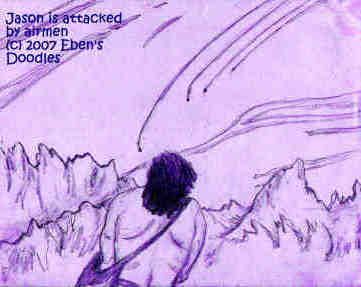
He knew he had a fight on his hands, and came prepared with javelin and sword. His javelin, first!
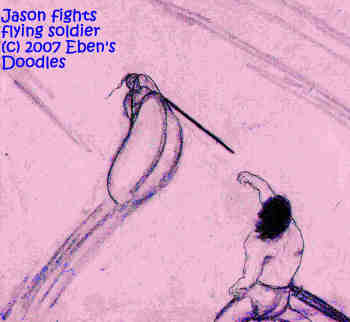
Though struck, the airman flew off, but he did not go very far, before tumbling and falling into a deep ravine. There was a loud noise, and
flames shot out of the ravine, and billows of black smoke.
As the Argonauts made last minute preparations, Medea watched secretly, where she found a private place high in a tower looking down on the king's harbor. It was a narrow tower, with only one way up so she could hear anyone approaching. There she remained, until Jason's sailing, while the palace searched high and low for her.
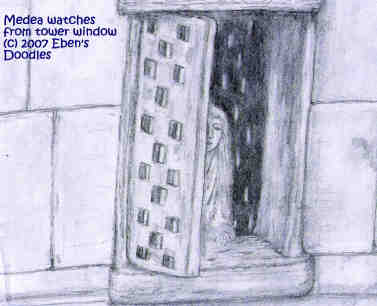
The decision made, Jason inspected the loaves of bread, the wine,
and the other supplies. He had to make certain the sail and the ropes and
other gear were seaworthy--though he was not intending to put to sea.
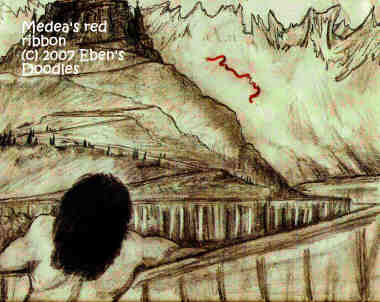
Would it fly overhead and pass them, dropping in the river?
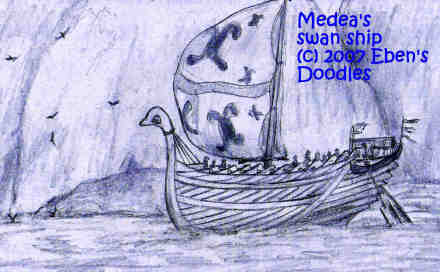
Arriving with the swanship
at the very time they were most needed, her mariners
took her aboard and she sat in the canopied stern.
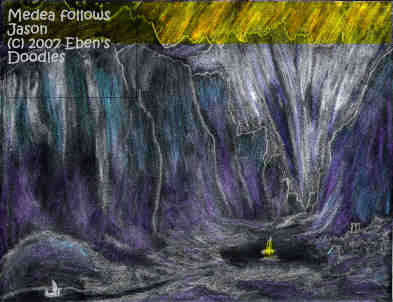
It was just as well the prince and princess set out as early as they did. There were sudden, bright glows in the heavens, which moved in unison toward the palace-fortress on its seemingly impregnable site high above the river and the city and port of Aea.
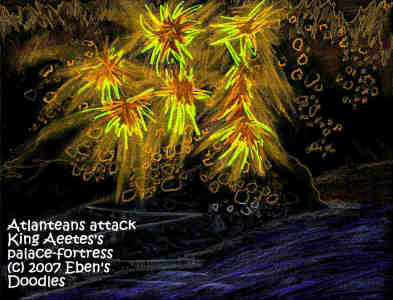
They too caused smoke and fire and tremendous noise--so that the whole city of Aea ran screaming into the streets, thinking
it was an earthquake or a mountain exploding down upon them.
The first day of sailing went without incident. Drawing near a city, Jason and his Argonauts saw that first impressions were deceiving. It was nothing but ruins, they realized, as they sailed close. Even the wharves and the shipping that should have been there in the river port had been burnt. The walls that protected the entrance
to the mountain valley and the city nestling on the mountain slopes and in the
valleys, they too had been burnt and broken down. Where there any people that had survived? they wondered. Who had done this destruction?
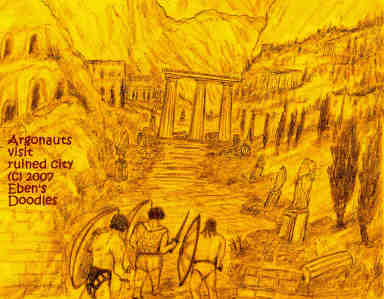
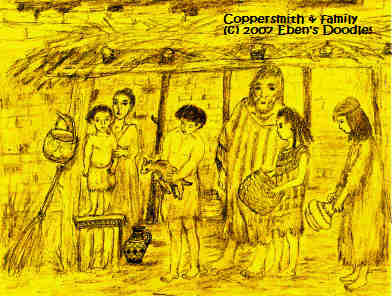
The Argonauts looked at the several pots, the basket held by one of the daughters, and even the kid goat. As for the vessels, they could buy them to help the coppersmith and his family
earn something they might use to buy grain for food--but the kid goat? It was too small, and would not feed the Argonauts even if it were made into soup. Best leave it to the family who needed it far more than they, the Argonauts decided.
Unknown to both parties, Aea and the palace fortress were
destroyed, and the king and his court and royal guards dead.
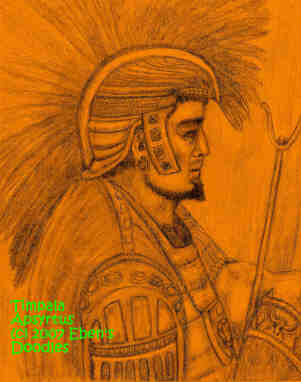
What was he to do? He had to come with heaped up gold and hundreds of slaves--or not return at all,
for his father's rages were to be feared, even by his son and heir.
Since he commanded the navy, he was at the moment the most powerful man in Colchis. Even
his father could not muster a fleet equal to fight his and hope to win.
As Timpala set out after Jason, there was a very sensitive, watershed agreement reached in the council of the Atlanteans. Up to this point, they had been more a danger to themselves than Earth, with their constant
struggles for dynastic rivals, supporting this one and that one, with
no one able to gain complete advantage so that the whole question of who should
rule Atlantis was settled once and for all.
Yes, she knew of the Dauphin Prince and his consort, lying in state in the archives left in
Mizraim, but that was a matter of small importance to her also. With the power of state vested in her, she could leave them there forever to rot if she chose--and she so chose. As for the resettlement of her people--that was still a bit in the future, she knew. Earth was still too barbaric for them to take charge of it as overlords. But as it developed, with Atlantean knowledge and guidance, it would provide a home for her and her people--with the earthlings as her slaves, of course.
Elektra's view of humans? They were less than ants to her, of course. But they could be made useful, with enough control exerted over them. Now that the crucial questions of power and dynasty were being resolved, with her gaining
the leadership of a slim majority of the nobles, she was determined to give more attention to the matter of the humans on earth. Her eyes were turning increasingly away from her own immediate household to the human species--and when she paused to examine what was transpiring in the Unfriendly Sea sector, she could not help but become interested in the career of a certain Achaean prince named "Jason the One-Sandalled" by his human contemporaries.

Those Atlantean eyes were essentially non-human eyes--completely devoid of human sympathy or feeling, but entirely self-serving, pitiless eyes, unable to tolerate anything that diverged in the least from her own agendas and her ultimate taking of her seat on the throne of a reborn Atlantis.
As the Argo cleared the last stretch of the river gorge, Jason stood at the mast, thinking of this moment, itself a triumph over many troubles, toils, and snares. As he was enjoying the thought, he caught his first glimpse of a forest up ahead, its trees so tall they stood up over the surrounding slopes of the mountains.
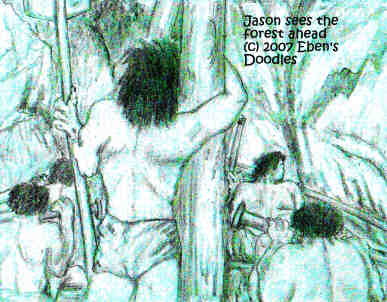
"This is it, the hidden place we are looking for! At last!" he shouted to the men. "God in the heavens has been good to us, and led us true, as an arrow to its target!" They cheered, as they realized
the end of their long voyage was reaching its objective. Soon they would see Jason come bearing the Golden Fleece, shining red and gold, in his hands! The thought made them row all the harder as the sail lost wind in the narrow spaces between the rock cliffs.
Jason's men made steady progress, even in the narrowing channel. The forest grew so thick, they could push the Argo through the tangled boughs only with
difficulty, but they were determined and would not turn back until they found
the tree that held the Golden Fleece and its dragon-guardian.
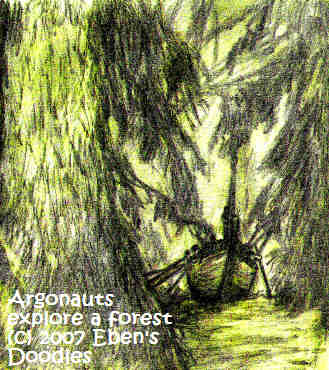
Medea, unable to follow him any further, turned back to a cove in a bend in the river, where she could wait for Jason to return with the Golden Fleece--something she never doubted he would find and win--however fierce the battle he had to wage with the dragon. She only regretted that she had not given him a potion for the dragon, to make it fall asleep at least, so that he could creep up and cut its head off. How easy that would have made his task--but she had counted on a rendevous, and it had not happened as she had planned.
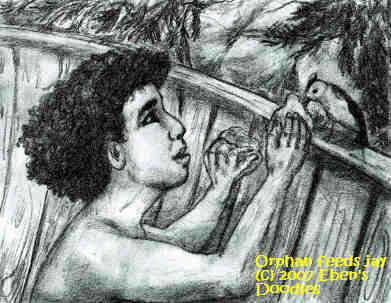
Medea was still waiting the next day when her brother arrived. Though she saw his ensigns and knew he had come, she had no idea why he had followed them. Yet she did not think he had any right to meddle in her own business, whatever his reasons for coming, so she did not go to greet him--the courtesy that was normally rendered to a royal brother, unworthy though this one was to have such a sister.
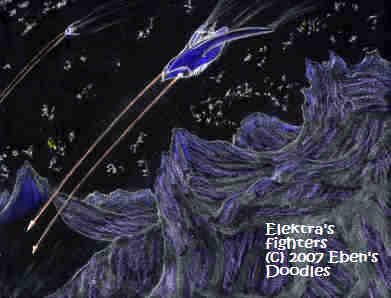
In moments Timpala's fleet was in flames. Medea, who had not slept
a wink, suspecting an attack by her treacherous, greedy, dull-witted brother, heard the screaming of the
burning men in the burning ships--but she could do nothing for them.
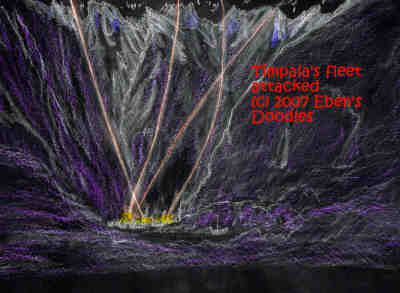
She had to consider something: at least Jason would not have to deal with
her hostile brother now, as the gods apparently had decided the matter.
Jason and his champions continued to press deeper into the jungle-like forest of the upper watershed of the Phasis. They paused when they came to a clearing, where the sun shown in full and bright. Here they decided to rest and camp, for they were tired of the gloom and tangled forest, fighting it all day long, hour after hour. Here they could enjoy the sky overhead, with the sun beaming upon them, warming
their hearts and bodies. And they could swim and wash off the grime of their
hard work of the day! And fix something good to eat! And tell some stories, and
play some games of strength or cunning--it was a welcome break for all, to be sure.
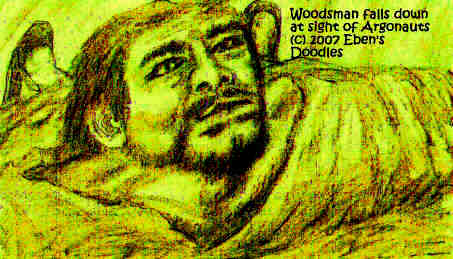
Amazed by the sight of his behavior, Jason had to go and see for himself
if the man were mad or not.

PLEASE GO TO PART VIII, AS IT APPEARS ON THE HOME PAGE

Retro Star Directory and Linking Page
(c) 2007, Butterfly Productions, All Rights Reserved

